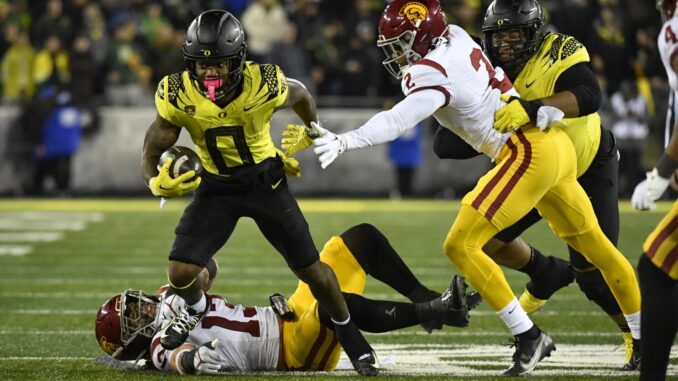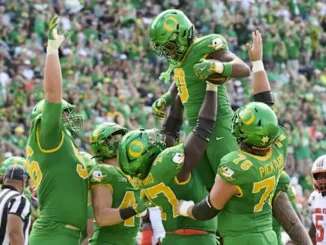
There’s no question that the USC football roster is loaded with talent. The Trojans perform well at home and against ordinary competition.
But when you put the Trojans on the road against ranked opponents, you get an outcome rife with futility, wasted opportunities, and baffling play-calling. Are players choking? Trying too hard? Are coaches just too clever for their own good?
I believe the Troy problem is systemic because I’ve noticed a pattern this week as USC comes to Eugene to play the Oregon Ducks.
Here is the pattern:
This season, the men of Troy posted a solid home win over Michigan State, which was 3-0 at the time. Then, the Trojans went on the road to play Illinois, a nationally ranked team that repeatedly failed when it mattered most.
With two minutes remaining and a first-and-ten at the Illini 16-yard line, USC fans expected the Trojans to run the ball to take time off the clock. Instead, head coach Lincoln Riley went immediately to the air. The play worked, and USC took a 32-31 lead.
So what’s the problem?
Well, had Riley run the ball a time or two, he would have taken time off the clock. By instantly going for the big score, he left the Illini with nearly two minutes on the clock, and that was all they needed to drive the length of the field, kick the winning field goal, and leave USC with mere seconds to retaliate.
The pattern of posting an inspiring win at home only to lose in bewildering fashion to a ranked opponent on the road repeated itself in the next two weeks.
USC looked like a top-ten program when it soundly defeated a nationally ranked Michigan team at home. The following week, the men of Troy traveled to Notre Dame, where a winnable game turned into a fiasco of botched opportunities and more questionable play-calling.
The Trojans took a 24-21 lead after a spectacular 59-yard touchdown pass to Ja’Kobi Lane. Just 15 seconds later, they were behind again because Notre Dame took the ensuing kickoff 100 yards for a score. The Irish led 27-24 after the extra point failed.
On its next two possessions, USC turned the ball over. On the following possession, which began with six minutes remaining, the Trojans ran three plays and gained nine yards.
With fourth and one, commentators discussed the probabilities of USC either punting or loading up to power-rush for that one yard.
They never imagined Riley would call for a reverse that would hand the ball off to a player who was not a quarterback, who would then try to pass to a player who was not a receiver. The play took forever to develop, which made it easy to defend. In other circumstances, the play might have had a chance, but attempting it in the state of Indiana in the rain and cold of November is mind-boggling.
Welcome to Trojan football. It shines in the sun but rusts in the rain.
To Riley’s credit, he admitted in postgame interviews that it was a ”stupid call”.
But, how many of those have USC fans seen? How many more will they tolerate?
Those patterns aren’t new.
Last season, USC posted a convincing home win against Wisconsin, then lost three straight road games, each by one possession, each from an inability to convert when it mattered most.
The pattern of an encouraging home win followed by road frustrations is alive and well with USC, and it is already in play this week when the Trojans play Oregon.
Last week, the Troy boys were impressive in a 26-21 home win over then-nationally ranked Iowa. Now they travel to the Northwest to face one of the nation’s top ten programs in the Oregon Ducks.
The Trojans have enough talent to beat Oregon. But USC has underperformed in all four road games this season and has either turned the ball over or called “stupid” plays in decisive situations.
I admit to a small amount of sympathy for USC fans. I mentioned before that I don’t often talk to USC grads, but when I do, I’m nice enough to order fries.
Experts are consistent in predicting a close, exciting game. They see the road deficiencies and inexplicable meltdowns that USC has had and generally favor Oregon by about nine points.
This Saturday will be exciting for fans because both teams are likely to showcase their aerial and ground attacks.
The difference will be on defense. USC ranks 90th or below in defending the rush (4.4 yards per attempt) and defending the pass (63.3% completion rate). Oregon ranks fourth nationally in both categories.
My savvygameline.com prediction system says Oregon will win 32-27. The final margin may be close, but it probably won’t feel like it.
To see all 64 predictions this week, visit savvygameline.com. It’s all for free. No registrations. No ads, no emails. No money. No kidding. It’s all for fun and not a business.
For the season, savvygameline.com is 560 – 183 in predicting winners. It is 28 games better than betting lines in setting point spreads and 25 games better in projecting total game points.
Savvy’s three best predictions last week were:
Florida Atlantic 35 – 24; final was 35 – 24
Kentucky 42 – 10; final was 42 – 10
Arizona State 28 – 24; final was 25 – 23




